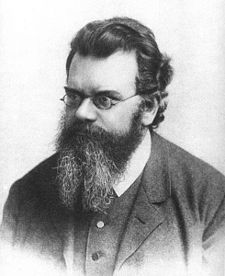
Back Ludwig Boltzmann Afrikaans لودفيغ بولتزمان Arabic لودفيج بولتزمان ARZ Ludwig Boltzmann AST Lüdviq Bolsman Azerbaijani لودویق بولتسمان AZB Людвіг Больцман Byelorussian Лудвиг Болцман Bulgarian লুডভিগ বোলৎসমান Bengali/Bangla Ludwig Boltzmann BS
Ludwig Eduard Boltzmann (/ˈbɒltsmən/,[2] US: /ˈboʊl-, ˈbɔːl-/;[2][3] German: [ˈluːtvɪk ˈbɔltsman]; 20 February 1844 – 5 September 1906) was an Austrian physicist and philosopher. His greatest achievements were the development of statistical mechanics and the statistical explanation of the second law of thermodynamics. In 1877 he provided the current definition of entropy, , where Ω is the number of microstates whose energy equals the system's energy, interpreted as a measure of the statistical disorder of a system.[4] Max Planck named the constant kB the Boltzmann constant.[5]
Statistical mechanics is one of the pillars of modern physics. It describes how macroscopic observations (such as temperature and pressure) are related to microscopic parameters that fluctuate around an average. It connects thermodynamic quantities (such as heat capacity) to microscopic behavior, whereas, in classical thermodynamics, the only available option would be to measure and tabulate such quantities for various materials.[6]
- ^ Cite error: The named reference
frswas invoked but never defined (see the help page). - ^ a b "Boltzmann". Oxford English Dictionary (Online ed.). Oxford University Press. doi:10.1093/OED/6830903157. (Subscription or participating institution membership required.)
- ^ "Boltzmann constant". Merriam-Webster.com Dictionary. Merriam-Webster.
- ^ Klein, Martin (1970) [1768]. "Boltzmann, Ludwig". In Preece, Warren E. (ed.). Encyclopædia Britannica (hard cover). Vol. 3 (Commemorative Edition for Expo 70 ed.). Chicago: William Benton. p. 893a. ISBN 0-85229-135-3.
- ^ Partington, J.R. (1949), An Advanced Treatise on Physical Chemistry, vol. 1, Fundamental Principles, The Properties of Gases, London: Longmans, Green and Co., p. 300
- ^ Gibbs, Josiah Willard (1902). Elementary Principles in Statistical Mechanics. New York: Charles Scribner's Sons.

